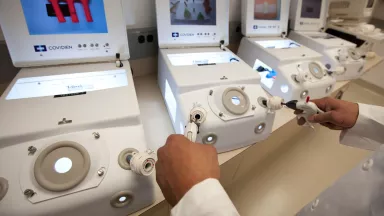Introduction
Our world-renowned orthopedic surgeons and orthopedists are experts in their fields with specialized training to provide the optimal diagnosis and treatment for a range of orthopedic conditions. We are internationally recognized for delivering the highest-quality orthopedic care to our patients.
What is carpal tunnel syndrome?
Carpal tunnel syndrome (CTS) is numbness, tingling, weakness and pain in your hand caused by pressure on the median nerve in your wrist.
The median nerve and several tendons run from your forearm to your hand through a small space in your wrist called the carpal tunnel. The median nerve controls movement and feeling in your thumb and first three fingers (not your little finger).
What causes it?
Pressure on the median nerve causes carpal tunnel syndrome. This pressure can come from swelling or anything that makes the carpal tunnel smaller. Many things can cause this swelling, including:
- Illnesses like hypothyroidism, rheumatoid arthritis and diabetes
- Repeatedly making the same hand movements, especially if the wrist is bent down (your hands are lower than your wrists), or repeatedly making the same wrist movements.
- Pregnancy
What are the symptoms?
Carpal tunnel syndrome can cause tingling, numbness, weakness or pain in the fingers or hand. Some people may have pain in their arm between their hand and elbow.
Symptoms most often occur in the thumb, index finger, middle finger and half of the ring finger. If you have problems with your other fingers but your little finger is fine, this may be a sign that you have carpal tunnel syndrome. (A different nerve gives feeling to the little finger.)
You may first notice symptoms at night. You may be able to get relief by shaking your hand.
How is it diagnosed?
Your doctor will ask if you have any health problems, such as arthritis, hypothyroidism or diabetes or if you are pregnant, and they will ask if you recently hurt your wrist, arm or neck. Your doctor will want to know about your daily routine.
During the exam, your doctor will check the feeling, strength and appearance of your neck, shoulders, arms, wrists and hands. Your doctor may suggest tests, such as blood or nerve tests.
How is it treated?
Mild symptoms of carpal tunnel syndrome usually can be treated with home care. You can:
- Stop activities that cause numbness and pain. Rest your wrist longer between activities.
- Ice your wrist for 10 to 15 minutes one or two times per hour.
- Talk to your doctor about trying nonsteroidal anti-inflammatory drugs (NSAIDs) that can help relieve pain and reduce swelling. Be safe with medicines. Read and follow all instructions on the label.
- Wear a wrist splint at night, which will take pressure off your median nerve.
The sooner you start treatment, the better your chances of stopping symptoms and preventing long-term damage to the nerve.
You also may need medicine for carpal tunnel syndrome or for a health problem that makes you likely to get carpal tunnel syndrome.
Surgery is an option when symptoms are so bad that you can’t work or do other things even after several weeks to months of other treatment.
How can you keep it from coming back?
To keep carpal tunnel syndrome from coming back, take care of your basic health. Maintain a healthy weight. Don’t smoke. Exercise to stay strong and flexible. If you have a long-term health problem, such as arthritis, hypothyroidism or diabetes, follow your doctor’s advice for keeping your condition under control.
You can also try to take good care of your wrists and hands by doing the following:
- Try to keep your wrist in a neutral position
- Use your whole hand—not just your fingers—to hold objects
- When typing, keep your wrists straight, with your hands a little higher than your wrists. Relax your shoulders and keep your arms at your sides
- If you can, switch hands often when repeating movements
Physician Referrals
Montefiore Einstein embraces a collaborative approach.
If you have a patient who could benefit from our services, please reach out.
718-920-2060
Schedule a Visit
Have a general question or concern?
We’re available to help you by phone or email.
• 718-920-2060 • orthofeedback@montefiore.org






